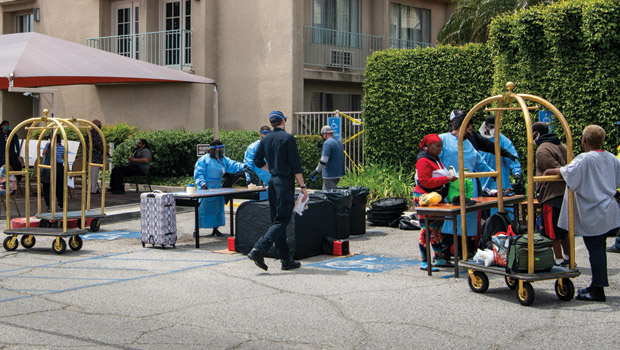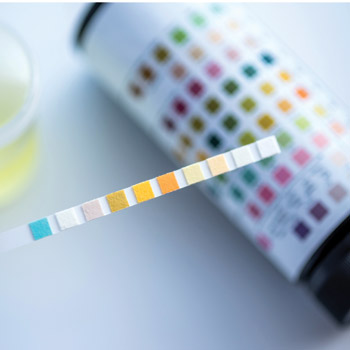Advocacy in the time of COVID-19
Since the pandemic, ACP has advocated for policies to support and sustain internal medicine physicians and their practices, to support public health, to ensure patient access to testing and treatment, and to ensure that there are enough internists to meet demand.
September marks the sixth month since the United States began shutting down because of COVID-19. Six months of progress and regression, resilience and surrender, reopening and reclosing, science versus anti-science. Six months of doctors doing the best for their patients even as they have felt abandoned themselves. Six months of seeing the best of America and the worst of it.
Six months of ACP advocacy in the time of COVID-19.
Thinking back on this time, I can say with pride that ACP has made a difference for the better. We have responded quickly to every challenge that has come along, without sacrificing our commitment to basing public policy on the best available evidence. We have advanced policies to support and sustain internal medicine physicians and their practices, to support public health, to ensure patient access to testing and treatment, and to ensure that there are enough internists to meet demand. Here are just some examples.
Payment for virtual visits: ACP was a leader in the effort to get Medicare and many other payers to pay for telehealth and phone calls at the same level as in-person visits and to lift unnecessary regulatory restrictions. We have urged payers to keep these flexibilities and policies in place at least through calendar year 2021.
Emergency practice support: ACP helped bring about more than $175 billion in Provider Relief Fund emergency payments to hospitals and physicians, as authorized by Congress and distributed by the Department of Health and Human Services (HHS). We created a Save Primary Care advocacy and social media campaign to press HHS to prioritize emergency funds to primary care physicians and their practices. We influenced CMS to suspend or delay unnecessary Medicare quality reporting requirements and other red tape.
Improved payments: We supported a provision in legislation passed by the House of Representatives to increase Medicaid payments for primary and comprehensive care to no less than the Medicare rates and urged the Senate to do the same. We successfully advocated for the suspension of a scheduled 2% “sequestration” cut to physicians and hospitals. We led a coalition effort to ensure that CMS moves forward with increasing payments for office visits and other evaluation and management services as planned on Jan. 1, 2021.
Access to personal protective equipment: We twice asked President Trump to invoke the Defense Production Act (DPA) to increase supply of respirators and gowns. (He invoked the DPA once, but on a more limited scale than we recommended.) When the government failed to do enough to ensure access to PPE, ACP helped fill the gap by partnering with Project N95, a national clearinghouse for PPE, connecting our members with more than 145,400 N95 masks and 70,440 isolation gowns (the count as of late July) sold at cost through ACP.
Public health response: ACP has repeatedly urged policymakers to stand with science and scientists, opposing the administration's decision to withdraw from the World Health Organization, urging that the CDC be given a central role in planning and implementing the public health response, and standing with Anthony S. Fauci, MD, MACP, as he was subjected to political efforts to undermine him. We issued our own scientific and public policy recommendations on safely and responsibly resuming economic and social activities. We called for the wearing of masks by the public and requiring them when social distancing is not possible, when recommended by public health authorities. We called for Congress to invest millions of dollars in testing and contact tracing. We opposed “crisis standards of care” that would discriminate against patients based on age or disability. We spoke out against discrimination against Asian American physicians and patients and for the need to address racial and ethnic disparities in infections, hospitalizations, and deaths from COVID-19.
Patient access to testing and treatment: ACP lobbied for enactment of legislation to make COVID-19 testing and visits available to patients at no out-of-pocket cost; urged that the federal matching contributions to the Medicaid program be increased and sustained; opposed price-gouging by pharmaceutical companies; and asked the administration, Congress, and payers to address COVID-19-related drug shortages. We urged states and the federal government to create special enrollment periods for the subsidized individual insurance plans offered through the marketplaces created by the Affordable Care Act. We opposed an effort in the courts, supported by the administration and some states, to overturn the pre-existing condition protections and other benefits mandated by the Affordable Care Act. We urged all states to expand Medicaid.
Internist workforce: ACP pressured the administration to ensure that visas for international medical graduates (IMGs) scheduled to enter the United States for U.S. residency programs were processed in time, called for reallocating unused residency slots to IMGs, urged that the Conrad 30 visa program be made permanent, and opposed new immigration restrictions that would make it more difficult for IMGs to enter the U.S. for training and patient care. We advocated for legislation providing loan forgiveness for frontline clinicians and increasing graduate medical education slots for internal medicine and other specialties facing shortages. ACP also called for reauthorization and funding of Title VII Primary Care Training and Enhancement grants.
On every challenge our health care system has faced over the past six months, ACP was there, advocating for members, advocating for their patients. I believe that our efforts have helped our members keep their practices open, get the PPE they need, and take care of patients virtually (and be paid for it), as well as increasing patient access to testing and treatment and improving the public health response.
Yet so much more needs to be done. The United States has failed on so many levels to take the steps necessary to reduce infections and deaths from COVID-19. We have seen political agendas undermine science and expertise, putting lives at risk. We know that too many internists still do not have access to PPE, and that many still struggle to keep their practices open.
ACP's advocacy will continue until, and after, this pandemic is behind us. Then, I hope that we all take the lessons learned from this terrible experience and do all that we can to ensure that the U.S. is not so unprepared, so uncertain, and so divided about what must be done the next time we face a public health emergency.





